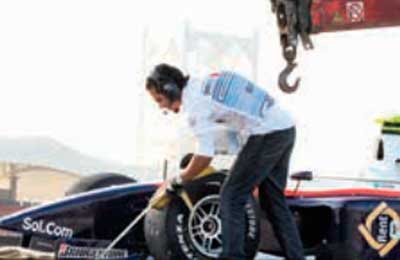
FLASHBACK: A marshal inspects a vehicle during a race
Marshals gear up for F1 race in Bahrain
MANAMA, March 25, 2015
Almost 1,000 race marshals will be working around the clock to ensure the success of the Gulf Air Bahrain Grand Prix next month.
It is taking place from April 17 to 19 at the Bahrain International Circuit (BIC), in Sakhir, and safety procedures are already being tested ahead of the biggest occasion on the country's calendar, said a report in the Gulf Daily News (GDN), our sister publication.
Workshops are now taking place in the run-up to the showpiece event and a total of 850 marshals are being readied to ensure things run smoothly.
“We are a team of 850 marshals who will be providing assistance, such as dealing with multiple car accidents, first aid, basic fire-fighting and the recovery of cars from the circuit,” said Motorsport Marshals Club Bahrain president and course clerk Fayez Ramzy Fayez.
Most of the marshals are Bahrainis, including some women, and they play an integral role in making sure the Formula One race passes without a glitch.
“These are all volunteers who work and train in their spare time,” said Fayez.
“This year we will be assisted by volunteers from India and Spain, who want to learn from our experience.”
People of all ages and backgrounds, including bankers and teachers, volunteer to become race marshals and they will be on duty on all three days of the Bahrain Grand Prix, during practice, qualifying and the race itself - which takes place at night.
“The marshal training continues throughout the year as they provide assistance in different events,” explained Fayez.
“There will be 150 medical marshals, 100 recovery marshals and another 150 fire marshals to assist during the three-day Formula One race.
“In addition to this we have race communicators, pit marshals, flag marshals and support staff such as those who check the weight of the F1 drivers, their uniforms and helmets.”
During the race, teams of marshals will be present around the circuit, with each group headed by a chief who constantly communicates with heads of other teams.
“There is a commander in control of all the chief marshals,” said Fayez. “We are fully prepared.”
He said the fact that the race takes place at night under floodlights posed its own set of challenges.
“Our challenge for the night race is how to respond in case of a power failure,” he explained.
Racing cars fitted with Kinetic Energy Recovery Systems (KERS) are another factor to consider and medical staff have previously expressed reservations about providing life-saving treatment to seriously injured drivers because some cars were charged with high-voltage electric systems.
One of the latest incidents that required emergency action by Bahraini race marshals took place during the fourth round of qualifying for the Bahrain Drag Racing Championship last month.
Bahraini drag racer Khalid Mohammed lost control of his white turbocharged Lexus, which became airborne and smashed into a concrete guardrail before overturning multiple times.
“Our marshals played a key role in this operation along with medical teams to rescue the driver, who walked away without any injuries,” recalled Fayez.
The main event of the Bahrain Grand Prix will start at 6pm on April 19 and will see some of the biggest names in motor sport go head to head around 57 laps of the 5.412km BIC track.
Bahrain marks the fourth round of the FIA Formula One World Championship. - TradeArabia News Service







